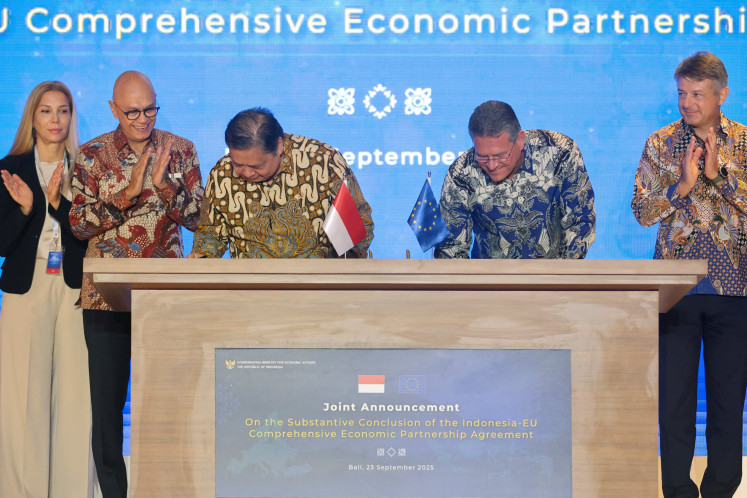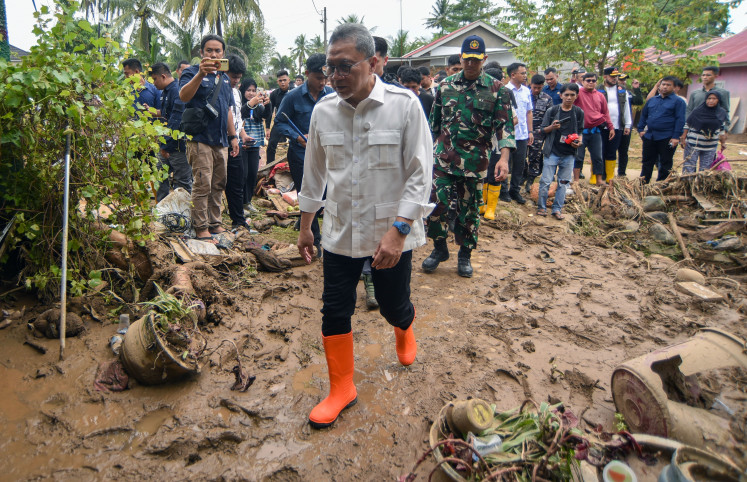Popular Reads
Top Results
Can't find what you're looking for?
View all search resultsPopular Reads
Top Results
Can't find what you're looking for?
View all search resultsMysticism shrouded Soeharto's life, death
Soeharto's eldest daughter Siti Hardiyanti "Tutut" Rukmana was reportedly angry with a number of politicians and state officials who visited her father at Pertamina Hospital
Change text size
Gift Premium Articles
to Anyone
Soeharto's eldest daughter Siti Hardiyanti "Tutut" Rukmana was reportedly angry with a number of politicians and state officials who visited her father at Pertamina Hospital. Instead of expressing genuine morale support, the visitors were instead querying the whereabouts of Soeharto's wahyu, or divine power to rule, that had helped him stay in power for 32 years.
Many regard the fact that no Indonesian president after Soeharto era has been able to win reelection or enjoy a stable government as a strong signal that the real transfer of power from the retired Army general has not occurred yet. Perhaps until he died Sunday, Soeharto had not picked his successor, said a former Golkar politician close to Soeharto's family.
A claim by the Indonesian Democratic Party of Struggle's leaders that Soeharto had entrusted the nation to the party's leader Megawati Soekarnoputri therefore can be perceived as not only a political commodity ahead of the 2009 elections, but also a recognition of Soeharto's uncontested power.
Indeed, until his demise, none of four presidents since his resignation in May 1998 has shown, let alone proven, commitment to bringing Soeharto to justice for his alleged corruption, collusion and nepotism. His poor state of health was another reason. Even Megawati, whose father Sukarno lost power in disgrace when Soeharto climbed to the throne and who herself fell victim to Soeharto's crackdown on opposition groups, did a little to act against the former dictator.
In Javanese mysticism, the transfer of power is believed to be marked by the departure of the wahyu, in the form of a glaring light, from an incumbent to a successor. Javanese spiritualists said Sukarno's wahyu moved to Soeharto's old residence on Jl. Agus Salim on the bloody night of Sept. 30, 1965.
In his biography, Soeharto flatly denied his belief in mysticism, although he admitted to practicing spiritual exercises and adhering to Javanese philosophy he inherited from past rulers, most notably Mangkunegara I, the founder of Mangkunegara principality in the Central Java town of Surakarta. His wife, Siti Hartinah, was a descendent of Mangkunegara.
Many believe Soeharto needed his wife to formally link him to Java's past rulers, and her demise in April 1996 marked the beginning of his downfall due to the loss of his legitimacy as a Javanese ruler. Two years after his wife died, Soeharto stepped down although he had previously tried to cling to power.
When Soeharto was in power, nobody dared to disclose his quest for power through spiritual exercises, including fasting, meditation in river junctions or inside a dark cave and regular visits to past Javanese leaders. A report from Semarang daily Suara Merdeka in 1999 said Soeharto used to meditate in a hill in the Central Java town of Cilacap. Other reports said Soeharto often climbed up Mt. Lawu for a ritual.
Soeharto was a self-proclaimed uneducated man who ruled Indonesia for a record 32 years, raising constant questions as to whether he really acquired and exploited the divine power.
Like it or not, Soeharto always identified himself as a Javanese king, albeit symbolically. Former Singaporean prime minister Lee Kuan Yew called him a "mega-sultan".
Soeharto's attempts to rival Javanese kings included the construction of the Astana Giribangun family cemetery on the slopes of Mt. Lawu in Central Java's Karanganyar. Higher up the cemetery is the burial ground of the Mangkunegara royal family. There were rumors circulating that Soeharto wanted his family cemetery to stand level with the Mangkunegara's, but the more efforts were made the more the land where Astana Giribangun was built began to slide.
Soeharto's obsession with national unity was reminiscent of the Javanese power culture, which in the past prompted the expansionist politics of Majapahit King Hayam Wuruk, whose sphere of influence spread across Indonesia today and reached out to Malay Peninsula. There were reports that Soeharto brought in a mask of King Hayam Wuruk as well as various kris or traditional daggers deemed sacred to his private residence on Jl. Cendana.
Emulating Java's past rulers, Soeharto could not tolerate separatism and was reluctant to accept regional autonomy, which in practice is now close to federalism.
Unity also requires absolute consensus, particularly in the decision-making process. During his reign, Soeharto coined "round democracy" as against "oval democracy", which meant his dislike of anything that spoilt consensus. Soeharto was always elected president through the unanimous endorsement of the People's Consultative Assembly. His handpicked deputy was elected in an identical manner. United Development Party leader Djaelani Naro tried in vain to challenge Soeharto's vice presidential choice of Sudharmono in 1992.
Under Soeharto, unity also annihilated opposition and criticism. He spoke to a group of military generals and government critics known as Petisi 50 using the Javanese saying Rumangsa bisa ning ora bisa rumangsa, which literally means someone who feels capable but is unable to measure his capabilities. Soeharto left his strongest loathing for the opposition groups, which he threatened to "clobber".
For many Javanese, and perhaps the country's political elite, Soeharto's demise leaves an unanswered question regarding the succession of leaders in Indonesia. Centuries ago, noted Javanese writer Ronggowarsito foresaw a future succession of great leaders on Java Island, which began with Satrio Kinunjara Murwa Kuncara (a leader who moves from one prison to another), Satrio Muktiwibowo Kesampar Kesandhung (a leader who finds glory but ends up with trouble), Satrio Jinumput Sumela Atur (a handpicked leader), Satrio Lelana Tapa Ngrame (the leader who travels a lot), Satrio Piningit Hamong Tuwuh (a leader who is groomed within the people), Satrio Boyong Pambukaning Gapura (the leader who opens the gate) and Satrio Sinandita Sinisihan Wahyu (the most blessed leader).
The pattern looks like it fits the succession of Indonesian leaders since 1945, but do we need to care? Ask the politicians.
The author is a staff writer at The Jakarta Post.










